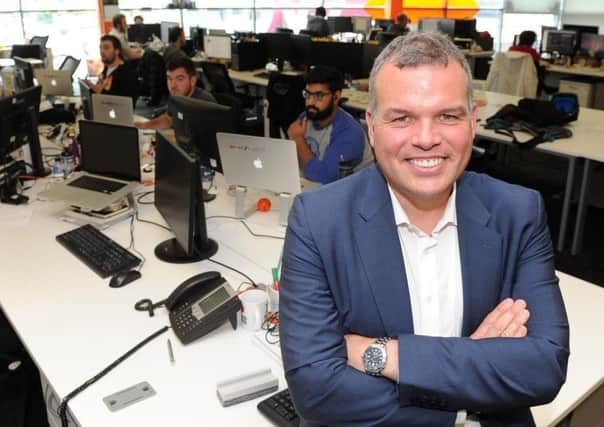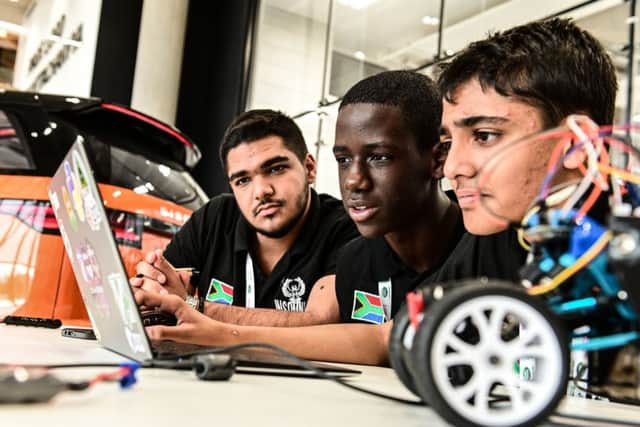Why the future UK workforce needs to be digitally-capable – WANdisco founder David Richards


Despite good intentions, teaching young people the ins and outs of Java, HTML and Python is not enough to address the growing skills shortage in our fast-developing technology sector.
The Fourth Industrial Revolution isn’t just on the horizon, it’s happening now. We have entered a new digital age, characterised by the rise of artificial intelligence and digitalisation, where the job market is rapidly transforming.
Advertisement
Hide AdAdvertisement
Hide AdIn the not-so-distant future, it is estimated that around 800 million jobs will be replaced by AI. Machines will take over menial and mechanical tasks, reducing labour costs and improving efficiency for businesses but also eliminating entire professions from the job landscape.


It’s not all doom and gloom, however. As jobs disappear, news ones will be created, and the workforce will be relieved of the slog of tedious tasks. The majority of jobs that will be available to our children don’t exist yet – the next generation needs to be prepared for the jobs that AI and other emerging technologies will unlock for us.
Future roles will demand advanced digital skills, and abilities that only humans possess. When challenged by the capabilities of AI, the workforce of tomorrow will need to demonstrate abilities that robots do not have – its human skills.
The age of automation is only a dauting proposition if we fail to adequately prepare our workforce. In the UK, we are treading a dangerous path, with our education system lagging behind in digital and creative education.
Advertisement
Hide AdAdvertisement
Hide AdUK schools are not preparing children for jobs in today’s digital economy, let alone for jobs that don’t even exist yet. The curriculum and careers advice are out of date and need reform.
“We must move from knowledge-rich to knowledge-engaged” were the words of Robert Halfon, chairman of the Education Select Committee, speaking about scrapping the current GCSE model and shifting to greater focus onto personal development.
This is a step in the right direction – we must use such calls to action as a stepping stone to look critically at our education system and address the fact that it is failing our children.
A focus on rote learning, as opposed to critical and creative thinking, does not distinguish pupils from machines. In a future where automation will replace jobs, knowledge alone will be useless to school leavers or graduates entering the job market.
Advertisement
Hide AdAdvertisement
Hide AdWhen implementing a policy change it is key to know where it is working well. The UK can learn from the US in terms of digital skills – it is no coincidence that the leading country in the tech industry is also where children are taught applied skills in schools.
In the US the emphasis is on students developing creativity and critical thinking – skills essential for needed for the entrepreneurial and innovation-driven jobs of the future. The UK needs exactly that.
Young minds are curious, and by reducing learning to memorisation and exams, we are closing the door on their problem-solving potential, not to mention demotivating them. I’m old enough to remember when one could take a calculator into a maths exam for the first time and it felt like cheating. Why can’t students take an iPad or smartphone into an exam? It seems logical, given those are the tools that they will use in the real world.
There is value in combining curiosity, data and the latest technology, for a positive impact on society – and students must understand that.
Advertisement
Hide AdAdvertisement
Hide AdThrough my charitable organisation, The David and Jane Richards Family Foundation, we aim to facilitate this. We address the digital skills gap in the UK education system by providing hands-on computing programmes for schools.
This should be the norm on the curriculum. We need more influential voices from all industries speaking up about the importance of digital skills and thinking creatively, suggesting solutions on how to drive change in the education system.
The future UK workforce needs to be digitally-capable, but not replicating what technology can do. Schools and colleges need to understand that preparing students for the future workforce means more than just offering coding as an optional course. A combination of the core curriculum with data science, applied technical and creative skills needs to become the new standard.
Major revolutions to the world of work have happened in the past, and we have adapted.
Advertisement
Hide AdAdvertisement
Hide AdWe face a similar watershed moment here. It’s time we stop fearing technological change and instead, adapt and prepare for it.
David Richards is CEO and founder of the Sheffield-based software giant WANdisco.